创新大学英语unit1-3
创新大学英语听说教程Unit-1
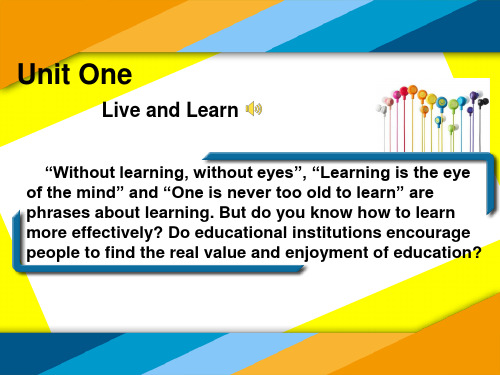
Live and Learn
“Without learning, without eyes”, “Learning is the eye of the mind” and “One is never too old to learn” are phrases about learning. But do you know how to learn more effectively? Do educational institutions encourage people to find the real value and enjoyment of education?
Part Two Learn How to Learn
Jenny is a first-year student. As the new term is coming, she feels more and more excited and a little bit worried about what kind of new life is waiting for her. The following are a series of dialogues between Jenny and her second-year friend Peter.
in studies between university and middle ( ) school.
M: What are the main differences? W: At college, most of the time, we must decide what to do on our own. In the past , however, we did
新一代大学英语(提高篇)综合教程1 Unit 3教学课件iProduce

新一代大学英语(提高篇) 综合教程 Unit 3
Produce
Basic elementsSTEP 1
Features
content Including date, itinerary, destinations, detailed description
of activities, meals, hotel and the inclusion or exclusion of
• Remember to use the words and expression learnt from the two texts.
• Upload your travel plan to the online course after finishing it.
新一代大学英语(提高篇) 综合教程 Unit 3
adventure surge put simply
realm handful
mutual utility
exclusive stability
plunge into
take shape
consume utmost occur to
新一代大学英语(提高篇) 综合教程 Unit 5
Produce
Presenting your ideas: STEPC1riteria for self-evaluation and peer-evaluation
新一代大学英语(提高篇) 综合教程 Unit 3
Produce
Presenting your ideas: Draw up the travel plan
STEP 1
Follow the example above and make a two-day travel plan, using the interview information in the part of “developing your ideas”.
新标准大学英语3unit1-wearealldying原文+译文

新标准大学英语3U N I T1-W e a r e a l l d y i n g原文+译文(总7页)本页仅作为文档封面,使用时可以删除This document is for reference only-rar21year.MarchWe are all dying我们都在走向死亡have some good news and some bad news for you (as the joke goes). The bad news – and I'm very sorry to be the bearer – is that we are all dying. It's true. I've checked it out. In fact, I've double – and triple-checked it. I've had it substantiated and, well, there's no easy way to say it. we are dying. It's something that I always kind of knew, but never really chose to think about too much. But the fact is, within the next 70 or 80 years – depending on how old you are and how long you last – we are all going to be either coffin dwellers or trampled ash in the rose garden of some local cemetery. We may not even last that long. After all, we never quite know when the hooded, scythe-carrying, bringer-of-the-last-breath might come-a-calling. It could be sooner than we'd like. I have watched death from the sidelines, quite recently in fact, and nothing underlines the uncertainty and absolute frailty of humanity like the untimely exit of a friend.我给你带来一条好消息,还有一条坏消息(正如笑话所说的)。
创新大学英语预备级Unit1Part2译文及答案

Unit 1Passag e OneEnglis h Learni ng: Passio n and Method s Make Succes s英语学习: 热情和方法使你成功You need two things to learnEnglis h well: passio n and effect ive learni ng method s.要学好英语,你需要两件事:对英语学习执着的热情和有效的方法.Passio n makesyou want to team Englis h; the learni ng method s only tell you how to do it faster.热情是你想学英语. 有效的方法仅能使你学得更快Learni ng Englis h will be easier for you if you love learni ng Englis h. 如果你喜欢学习英语,那么你学起来就更轻松.It will be easier for you to rememb er new wordsand gramma r struct ures.你记生词和语法结构便更容易. It's becaus e the brainmore easily rememb ers inform ation on a subjec t that you like. 这是因为对于喜欢的学科的知识, 人的大脑记忆起来则更容易. But when you don't feel like learni ng Englis h, here are some things you can do: 但是假如你不喜欢学习英语, 以下的事你是能够做的:Rememb er that you alread y know some Englis h. 请记住, 你已经学到一点英语. That's a big succes s!这便是一种成功. Now it's time for more succes ses.现在是你取得更大成功的时候了. Rememb er thereis a lot that you don't know. 你要明白你还有很多的东西你不懂. You probab ly can't unders tandEnglis h-langua ge TV, read booksin Englis h, talk to native speake rs easily, and writeletter s withou t mistak es. 你也许看不懂英语电视节目. 读不懂英文写的书. 不能与英语本族人交谈, 也不能正确地写英文信. It's time to startusingpowerf ul method s of effect ive learni ng. 那这就是你的用高效的学习方法的时候肋It's time to gain----an impres siveknowle dge of Englis h.这也是你获得令人生畏的英语语言知识和能力的时候了. Try to find your weak areasand work on them.尽量找出你英语学习上的薄弱环节.并对其下功夫.Use your Englis h whenev er you can. 无论何时, 尽量把英语用起来.The more you use Englis h, the more you will want to learnit. 你用得越多, 你就越想学. Y ou can keep a diaryin Englis h; 你可以坚持用英语记日记, you can read intere sting booksin Englis h; 你可以读些有趣的英语书籍. or you can find a friend who is learni ng Englis h, at a simila r levelof skillto yourse lf, to talk aboutEnglis h with. 或者你可以找一个水平与你相当的学习英语的朋友和他一起调侃英语学习. Learni ng Englis h requir es action. 学习英语需要的是实际的行动.Youmay know all the learni ng tips, but if you don't startdoingthings, you will achiev e nothin g.一切学习方法你都懂, 但无行动.你将会一事无成.Passag e One1)Accord ing to the writer, learni ng Englis h well requir es ____________.A) both passio n and effect ive method sB) either passio n or effect ive method sC) passio nD) effect ive method s2) If you feel like learni ng Englis h,_______A) you can speakEnglis h wellB) your braineasily rememb ers everyt hingthat you likeC) you can more easily rememb er new wordsand gramma r struct uresD) you can use your Englis h any time3) What are your probab le weakne ssesof learni ng Englis h accord ing to the passag e?A) You cannot writeletter s correc tly.B) You can not only unders tandEnglis h-langua ge TV, but talk to native speake rs easily,C) You cannot read Englis h books.D) Both A) and C).4) The more you use Englis h,A) the more you will find it diffic ult B) the more mistak es you will makeC) the more boredyou will become D) the more you will want to learnit5) What are the effect ive learni ng method s accord ing to the writer?A) Keepin g a diaryin Englis h, and talkin g aboutEnglis h with your friend.B) Buying some intere sting books.C) Singin g Englis h songs.D) Knowin g all the learni ng tips.。
新标准大学英语3 UNIT1-We are all dying原文+译文
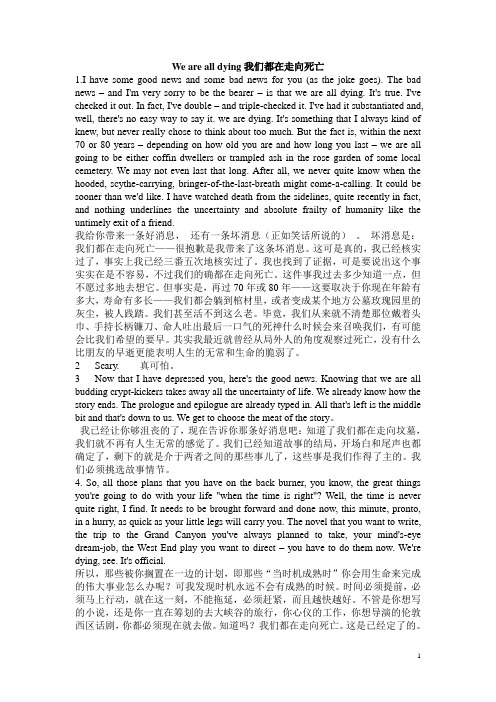
We are all dying我们都在走向死亡1.I have some good news and some bad news for you (as the joke goes). The bad news – and I'm very sorry to be the bearer – is that we are all dying. It's true. I've checked it out. In fact, I've double – and triple-checked it. I've had it substantiated and, well, there's no easy way to say it. we are dying. It's something that I always kind of knew, but never really chose to think about too much. But the fact is, within the next 70 or 80 years – depending on how old you are and how long you last – we are all going to be either coffin dwellers or trampled ash in the rose garden of some local cemetery. We may not even last that long. After all, we never quite know when the hooded, scythe-carrying, bringer-of-the-last-breath might come-a-calling. It could be sooner than we'd like. I have watched death from the sidelines, quite recently in fact, and nothing underlines the uncertainty and absolute frailty of humanity like the untimely exit of a friend.我给你带来一条好消息,还有一条坏消息(正如笑话所说的)。
大学创新英语综合教程1 Unit3 课文及翻译课文及翻译
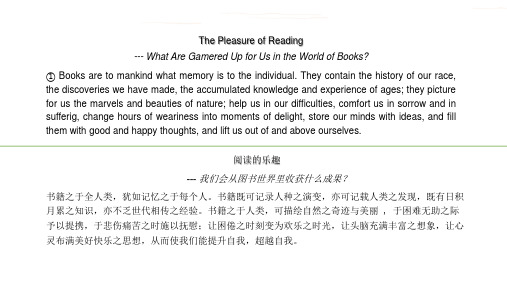
④ Books, indeed, endow us with a whole enchanted palace of thoughts.There is a wider prospect, says Jean Paul Richer, from Parnassus thanfrom a throne. In one way they give us an even more vivid idea thanthe actual reality, just as reflections are often more beautiful than realnature. "All mirrors," says George Macdonald, "The commonest room isa room in a poem when look in the glas."
The Pleasure of Reading --- What Are Gamered Up for Us in the World of Books?
① Books are to mankind what memory is to the individual. They contain the history of our race, the discoveries we have made, the accumulated knowledge and experience of ages; they picture for us the marvels and beauties of nature; help us in our difficulties, comfort us in sorrow and in sufferig, change hours of weariness into moments of delight, store our minds with ideas, and fill them with good and happy thoughts, and lift us out of and above ourselves.
全新版大学英语第三册 Unit 1 课后习题答案
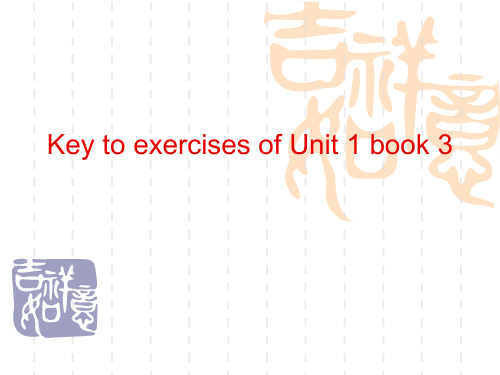
Hardships working hard both in winter and in summer harsh environment and weather condition anxious moments after the writer quit his job cutting back on daily expenses solitude
Байду номын сангаас
23. 怆然离去 leave with a feeling of sorrow 24. 自豪感 a sense of pride 25. 一旦形势好转 once economic conditions improve 26. 赚钱 earn money
The Countryside The countryside of Britain is well known for its beauty and many contrasts: its bare mountains and moorland, its lakes, rivers and woods, and its long, often wild coastline. Many of the most beautiful areas are national parks and are protected from development. When British people think of farmland, as well as open spaces, they imagine cows or sheep in green fields enclosed by hedges or stone walls, and fields of wheat and barley.
新标准大学英语视听说教程2册unit1-3听力原文
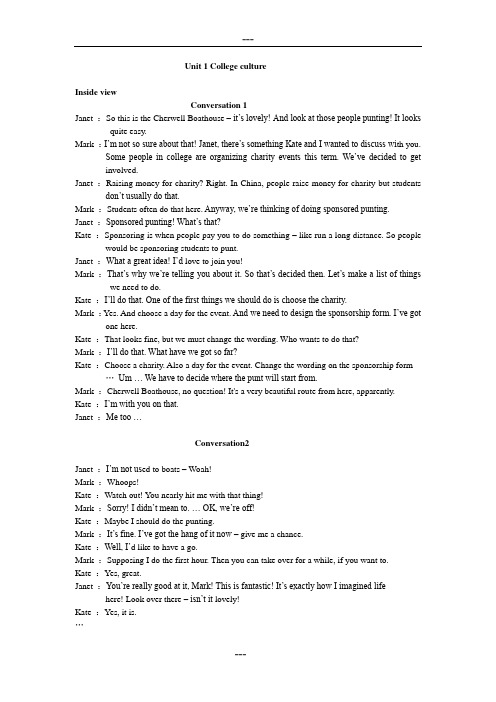
Unit 1 College cultureInside viewConversation 1Janet :So this is the Cherwell Boathouse –it’s lovely! And look at those people punting! It looks quite easy.Mark :I’m not so sure about that! Janet, there’s something Kate and I wanted to discuss wi th you.Some people in college are organizing charity events this term. We’ve decided to get involved.Janet :Raising money for charity? Right. In China, people raise money for charity but students don’t usually do that.Mark :Students often do that here. Anyway, we’re thinking of doing sponsored punting.Janet :Sponsored punting! What’s that?Kate :Sponsoring is when people pay you to do something – like run a long distance. So people would be sponsoring students to punt.Janet :What a great idea! I’d love to join you!Mark :That’s why we’re telling you about it. So that’s decided then. Let’s make a list of things we need to do.Kate :I’ll do that. One of the first things we should do is choose the charity.Mark :Yes. And choose a day for the event. And we need to design the sponsorship form. I’ve got one here.Kate :That looks fine, but we must change the wording. Who wants to do that?Mark :I’ll do that. What have we got so far?Kate :Choose a charity. Also a day for the event. Change the wording on the sponsorship form …Um … We have to decide where the punt will start from.Mark :Cherwell Boathouse, no question! It's a very beautiful route from here, apparently.Kate :I’m with you on that.Janet :Me too …Conversation2Janet :I’m not us ed to boats – Woah!Mark :Whoops!Kate :Watch out! You nearly hit me with that thing!Mark :Sorry! I didn’t mean to. … OK, we’re off!Kate :Maybe I should do the punting.Mark :It’s fine. I’ve got the hang of it now – give me a chance.Kate :Well, I’d like to have a go.Mark :Supposing I do the first hour. Then you can take over for a while, if you want to.Kate :Yes, great.Janet :You’re really good at it, Mark! This is fantastic! It’s exactly how I imagined life here! Look over there –isn’t it lovely!Kate :Yes, it is.…Janet :Kate, everything’s organized, isn’t it, for collecting the sponsorship money?Kate :Yes, I’ve arranged for people to get the money to me by next Friday –if they haven’t paid online. I’ll count it all up.Janet :Good. We’d better have a meeting soon after that, don’t you think? How much have we raised?Kate :About 600.Janet:Fantastic! I’m so enjoying this!Mark :Hey guys, I’ve got a suggestion – how about moving over to the bank and we can have our picnic! Hey, look, there’s Louise and Sophie!Mark :Whoo …Girls:Mark!Janet :Are you all right?Mark :Er … Of course I’m all right. Kate, I think it’s your turn to punt!Outside viewV/O (画外音)Harvard University in Cambridge is one of the best universities in the world. We spoke to Alex Jude, the university’s Head of Communications. He explained that Harvard looks for the best and most talented students from around the world.AlexHarvard actually seeks students from around the world, the best students that we can find, to study chemistry, or study literature, or study government, or business. Our business school is particularly well-known around the world, as is the medical school and law school, so, um, and, and the Kennedy School of government, for the John F. Kennedy School of Government, so, er, we do seek very, very talented students and we have open doors for them.V/O (画外音)We asked five students at Harvard to tell us what kind of social life they have.AshleyUm, well relaxing is a little hard to do around here, but basically, I mean, I still, I, I live nearby anyway, so I see a lot of my friends, and … Um, there’s a good social life here if you look for it. I go to the gym, run. So that’s what I do.AdamIt is whatever you want it to be. It’s go od. If you wanna go out party, do anything you can. If you wanna sit in your room and study all night like my friend over here, you can also do that.BrianSocially, like you said, it’s, it’s a lot of what you make it. Um, we don’t have fraternities here, and so, you know, that’s, it’s obviously not as social. There’s not as many parties as there would be on another campus. Um, but on a Friday or Saturday night, there, there, there will be a party. Usually we end up studying until about 10 o’clock. And then we, and then we’ll go out and have fun maybe, or just watch a movie with friends, or, you know, whatever is going on for the night. JodieNot everyone would agree with me, obviously, but it’s, I think it’s a fun place to be.Interviewer: Have you made a lot of friends?Jodie : Oh, definitely.Interview. :Mm.Jodie: Many.Interviewer: What, what do you do with your friends?Jodie: Um, well, I like to go to concerts. I’m in three music groups, so I have lots of rehearsals during the week for that. Um, just do, you know, some fun things, on the weekend.V/O (画外音)We asked the Harvard students if they use the Internet.Ashley: Um, I, I use it a fairly good amount. Um, our library system is online, so I use that a lot.And a lot of my classes, you know, have to do research papers. You can find a lot of information on there, so.Interviewer: So how often do you use it, a week, a day?Ashley: Um, I use it probably on more of a weekly basis. Maybe three or four times a week. Brian: Oh yes, definitely. We live through the Internet actually. Well, I do a lot of research through the Internet, follow my stocks on the Internet. Um, well, even though e-mail isnot officially Internet, we, that’s how we communicate a lot at college, so, through thee-mail.John: Um, I use the internet mostly for, er, I’d say, sort of leisure purposes. I mean, I play, um, I use it for a lot of, I don’t, we don’t have TV in my room, so I use it, uh, uh, go to the CNN website, keep up on current events, things like that. Uh, I also, uh, you know, there’s some little games to play over the Internet. Um, just um, I go to to see what’s happening, follow the Boston Red Sox, things like that. Um, I think a lot of courses use it to post things, but I, I don’t usually use it that much for research, or things. I tend to use the libraries for such things, so.Listening inPassage 1Voice-overHi, I’m Nick Carter, and this is SUR, your university radio station. This morning we went around campus to ask freshers –now half-way through their first year –the question, “How are you finding uni?” Here are some of the answers we got.Speaker 1It’s cool. It’s everything I hoped it would be. I’m very ambitious, I want to be a journalist and I want to g et to the top of the profession. I’ve started writing for the university newspaper so I’ve got my foot on the ladder already.Speaker 2I’m working hard and the teaching is as good as I expected. And I’ve made some good friends. But I’m very homesick. I’m Nigerian and my family’s so far away. I went home at Christmas for a month –that really helped, but man, I miss my family so much.Speaker 3“How am I finding uni?” It’s great. It’s not perfect, nothing is, but, like, I’ve got a brilliant social life, just brilliant, and I’ve made lots of friends. For the first few months I just didn’t do, really enough work. But I –I talked about it with my parents and I’m working harder now and gettinggood grades.Speaker 4Actually, I’ve been quite lonely to be honest. I’m a bit shy … everyone else seemed to find it so easy to make friends straight away. But things have been better recently –yeah, they have. I’ve joined a couple of clubs and like, it really helps to get to know people when you have shared interests. So, yeah –I’m feeling a lot happier now.Speaker 5Uni’s great, I love it. My only problem –and it’s quite a big problem – is money. My parents are both unemployed so, you know, they can’t help me financially. My grant just isn’t –it’s just not e nough for me to live on, so I’ve taken a part-time job as a waitress – a lot of people I know, like a lot, have had to do the same. I don’t want to have huge debts at the end.Speaker 6I love my subject, History, and I’m, I’m getting fantastic teaching here. I want to be a university lecturer and that means I have to get a first. I have a good social life but work definitely comes first for me.Passage 2Oxford and Cambridge – two universities so similar that they are often spoken of together as “Ox bridge”. They’re both in the UK, fairly near London, and both regularly come top in any ranking of the world’s best universities.The two universities began within a century of each other. Oxford University, now 900 years old, was founded towards the end of the 11th century. In 1209 there was a dispute between the university and the townspeople of Oxford. As a result, some of the Oxford teachers left and founded a university in the town of Cambridge, some 84 miles away. Ever since then, the two institutions have been very competitive.Unlike most modern universities, both Oxford and Cambridge consist of a large number of colleges. Oxford has 39 and Cambridge 31. Many of these colleges have old and very beautiful architecture, and large numbers of tourists visit them.In all UK universities, you need good grades in the national exams taken at 18. But to get into Oxford and Cambridge, it’s not enough to get A grades in your exams. You also have to go for a long interview. In these interviews, students need to show that they are creative and capable of original thinking.Through the centuries, both universities have made huge contributions to British cultural life. They have produced great writers, world leaders and politicians. Cambridge, in particular, has produced scientists whose discoveries and inventions have changed our lives.Among the great university institutions is the world’s most famous debating society, the Oxford Union, where undergraduates get a chance to practise speaking in public. Cambridg e’s comedy clubFootlights has produced many first-class comedians, while some of the UK’s most famous actors and actresses began their careers at The Oxford University Dramatic Society, known as OUDS. Then there’s the Oxford and Cambridge Boat Race, whic h takes place every year in March or April, and is watched on television all over the UK.So with all this excellence in so many fields, it’s not surprising that the ambition of clever students all over the world is to attend either one of these great universities.Unit 2 Mixed feelingsInside viewConversation 1Kate :Come in. Hey, Janet.Janet :Hi Kate, are you busy?Kate :Yes, I’m just doing an essay. But it’s great to see you. So what’s new?Janet :Well, nothing much.Kate :You look a bit fed up. What’s bugging you?Janet :Well, I had a phone call from my parents and it made me feel homesick. It happens every time they call, and it gets me down.Kate :I’m sorry to hear that. I know how you feel. I love speaking to my mum and dad, but I always feel miserable after the call.Janet :My dad doesn’t say much, and I want to speak to him, but I wish I knew what to say. Kate :Don’t let it get to you. My dad doesn’t say much on the phone either. I call, he answers the phone, and says, “Hi, I’ll pass you to your mother.” It’s really irritating.Janet :But I miss him and my mother a lot, and I like to hear his voice.Kate :Just tell him what you’re up to.Janet :Sometimes I feel as if I made a mistake leaving home and coming to Oxford.Sometimes I feel like a moody teenager.Kate :Try not to worry about it, Janet. It’s normal to feel like that. I understand how you feel, butI bet everything will be fine next term. You’ll get used to it. Hey, why don’t you do what Ido?Janet :What’s that?Kate :When my dad calls, I ask him for more money! He usually says no, but at least I get to hear his voice!Janet :Maybe. I’m sorry to take up your time, Kate, but I must go now. Bye!Kate :Wait a minute …!Conversation 2Kate :I think I may have upset Janet last night.Mark : What happened?Kate :She came to see me. I was busy doing an essay but I was r eally pleased to see her. She’d had a call from home, and said she was feeling homesick.Mark : Poor kid! It must be tough on you guys, living so far away from home.Kate :I tried to make her laugh, told her not to worry about it, and that it was normal to feel miserable. Suddenly she looked miserable, and then she got up and said, “I must go now”and left my room. It was really sudden. I felt as if I’d said something wrong.Mark :Maybe she was just being polite. It was probably because she realized you were workingand didn’t want to disturb you.Kate :I just wonder if she found it difficult to talk about her feelings with me. Maybe I shouldn’t have tried to make her laugh? Perhaps she thought I wasn’t taking her s eriously.Mark :I wouldn’t worry about it. Put yourself in her shoes. How would you feel if you were a student at college in China?Kate :I know. That’s why I feel bad. If only she had stayed longer! I wish I could have helped her more.Janet :Hey, everyone!Mark :Hi Janet, you look cheerful!Janet :Yes, I’ve just got my essay back. I got an alpha minus!Kate :What an amazing grade! Well done.Mark :I’m really happy for you, Janet.Janet :I feel on top of the world!Outside viewSebastienHi. I’m Sebastien. I’m from Germany. Um, the idea of IQ of a measure of your brain power has been around for a while, but recently there’s been this new idea of the EQ – your emotional quotient. And by now, it’s actually almost being regarded as more important.If you look at it, businesses will ... Well, they will prefer employing people with great EQ. Well, of course, IQ cannot be disregarded, but um, EQ does have its importance as well. Uh, I believe that, um, (I)mean, people, most people will have, um, their basic means of communicating with other people. Most people are somewhat socially adept, and just like most people have, you know, a basic general knowledge. But then, what I think really is the difference betweenIQ and EQ, I mean, you can have a “brainiac”, and they will be great at most things they do, but if you just can’t get along with him, if you just can’t communicate with him, I mean, you know, he’s not really that useful.KimHi. This is Kim. I’m originally from Korea, and I was raised in Cali fornia. And today, we are going to talk about the differences between IQ and EQ –IQ meaning your intelligence, EQ meaning your emotions. Now, in … When I was, when I was a little, little boy in Korea, I had to take … I think I’d taken like two or three IQ tests before the age of ten, which is when I moved to California. So, I guess we stress a lot of importance on intelligence, on having great IQ scores. But after I moved to the States, I learnt how to associate with people, and along the lines that this word EQ came up, you know, emotional, caring about … It’s basically how you deal with people, how you make people feel, and how people make you feel. I think they’re equally as, as important, but it seems that in the Eastern world they kind of stress on that a lot more back in the days. But I think again, you know, now that with Internet and people are communicating so much faster, there’s a better mixture of the two I think. There’s a stress on EQ in Korea as well, and a stress on IQ in the States. Thank you.TedHello. My name is Ted, and I’m from the United States of America. Today, I’m going to talk a little bit about IQ or EQ – which is most important, or which is more important. Now, for a long time when I was growing up, people said, “IQ. What’s your IQ? Take an IQ test.” But then EQ, your emotions, how you interact with people, that became very important. And I think they’re … that people might be onto something with that, because your EQ – how you deal with people, how you interact with people – is important. Now, a big part of this, in my opinion, is listening. I know I’m talking a lot right now, but if you want to get along well with people, you have to listen to them, so just take a minute, maybe shut your mouth for a minute, and listen to others, and then you can understand and communicate with them in a better way. So, part of EQ, I think, is listening – listening to others – and it can be more important than IQ.Listening inPassage 1Presenter: We’re fortunate to have as our guest today Dr Jenna Hudson, who has just written a book about how colours affect us in our surroundings, especially in the world of advertising. It’s called Market Colours. Dr Hudson, which are the most common colours in advertising and marketing?Dr Hudson :Well, of course, it depends what image the marketing team wish to project with their products. So for example, we often think of blue as a cold colour, but it also makes you feel peaceful, quiet, and it doesn’t suggest strong emotions. So it’s a favourite for ban ks and insurance companies, who wish to suggest the image that they are trustworthy. And for selling products, it’s often used to suggest something is pure and fresh.Presenter: What about red?Dr Hudson: You can sell almost anything with red. It’s a hot colour, which suggests a feeling of energy and even passion. It grabs your attention, and can make people buy almost anything. You often see red on magazine covers. But if you use it too much, it looks cheap and may make people tired. And orange has a sim ilar effect to red, it’s upbeat and happy, it suggests pleasant feelings and images. Most people react well to orange, and it’s especially popular in advertising and on packaging for baked food.Presenter: What about yellow, for instance?Dr Hudson: Yell ow is the colour of sunshine and it’s a positive, happy colour, so it’s used a lot in advertising. But it’s also often used for warning signs, direction signs, and so on, where you have to read the message quickly and at a distance.Presenter: What about less popular colours for advertising?Dr Hudson: Surprisingly, green isn’t used much in advertising except for garden products. It’s friendly and restful. It can be cool and soothing, the colour of apples and mint, but it can also be quite strong and many people associate it with unpleasant ideas of decay or slimy creatures. But most colours are not primary colours, they’re a combination. Absolutely. So yellow-orange is common, and often used to give animpression of style and class, it looks like gold. But it’s not often used in letters because it’s not very strong. And yellow-green reminds people of feeling sick. Blue-green works well as a cool colour, suggesting freshness, and is sometimes used for toothpaste products, bathroom products, food and household cleaning products. It has many of the advantages of blue without the disadvantages of green.Presenter: Fascinating!Thank you very much, Dr Hudson. Market Colours by Dr Jenna Hudson is on sale from next week, priced £15.99 …Passage 2Presenter :What makes you embarrassed, Sally?Sally :Oh, I’m easily embarrassed. If anybody notices me or looks at me, I get very emb arrassed.When people sing me Happy Birthday on my birthday, I get very embarrassed. Presenter :And what makes you upset?Sally :When people are selfish, people who think only of themselves. And cruelty –I can’t bear people who are cruel, especially to animals or children.Presenter :Jake, what makes you depressed?Jake :I hate it when it rains, and I don’t like people who look down on me, who think they’re superior to me without any reason.Presenter :And what makes you angry?Jake :When people don’t behave properly in public, bad behaviour like dropping litter or people pushing each other on the bus or the train.Presenter :Andrew, what makes you cheerful?Andrew :I like to see everyone around me being happy and having a positive attitude towards the future, optimistic people.Presenter :And what makes you jealous?Andrew :Well, to be honest, I just never feel jealous. I can’t see the point of it.Presenter :Monica, what makes you proud?Monica :I’m proud when I’m successful, especially in my work. Being recognized by my boss for what I can do makes me feel really proud. Oh, and my family. I’m very proud ofthem.Presenter :And what makes you nervous?Monica :Every time I teach a new class. The night before I’m very nervous. You don’t know wh at the kids are going to be like and how they might behave, or if they’re going tolike you.Presenter :Anything else?Monica :Doing interviews like this.Unit 3 Crime watchInside viewConversation 1Kate :So, what did you think of the movie?Mark :It was good but I thought it was too long.Kate :Yes, me too.Kate :Hey, where’s my bike? I don’t believe it! It’s gone!Mark :It was next to mine, you chained it up!Kate :Someone’s stolen it! Oh, how could they!Mark: Oh, Kate!Kate :How could someone have done this! The creep!Mark :It’s a really mean thing to do, steal a bike.Kate :It was a mountain bike and it cost a fortune –I don’t have the money to buy another one. Mark :Listen, I’ll go down the street and see if I can see anyone with it. Why don’t you go into that shop and see if they’ve seen anything suspicious? I’ll be back in a minute.Kate :OK.…Kate :Well?Mark :No luck. What did they say in the shop?Kate :I asked the shopkeeper if she’d seen anything –Mark :And?Kate :She said she hadn’t. I guess it was a long shot. She advised me to report it to the police.But according to her, bikes get stolen all the time around here.Mark :Listen, let’s get back so you can report it.Kate :I’ve got no bike. I’m just so upset!Mark :It’s not far to college. Come on!Conversation 2Mark :So did you ring the police?Kate :Yes. I went to the police station to report it.Mark :What did they say?Kate :No one’s found it. This woman said that Oxford has the fifth highest rate of bike theft in the country!Mark :You’re joking!Kate :That’s what she said.Mark :What else did she say?Kate :She told me that sometimes you do get bikes back – the thieves use them and then abandon them, apparently, and then people find them and report them.Mark :So you might get it back.Kate :I hope so, Mark, I really do. It’s just too much you know? But … um … what else? She told me to go to this sale they have of abandoned bikes. She thinks I might find it there.But it’s only every two months, I can’t wait till then! Honestly, Mark, I’m really furious! Mark :You can always buy a cheap bike on eBay.Kate :Hello … Speaking … You found it! Where was it? Is it …? Oh, that’s fantastic news!There was a lamp and a basket on it … Right … OK, thank you, I’ll be in tomorrowmorning to pick it up. Unbelievable! This guy found it!Mark :Brilliant! Was that the police?Kate :Yes. What they said was, someone dumped it outside this guy’s backyard.Mark :That’s so strange!Kate :The lamp’s been stolen and the basket.Mark :Forget about it! You’re lucky to get it back!Outside viewPart 1Presenter: Dodgy deals aren’t the only problems associated with doorstep sellers. Your door step presents these unannounced visitors with a real opportunity to undertake distraction burglary where they often pose as bogus officials to gain access to your home.I’m joined now by Ian Holt, from Thames Valley Police. Ian, just outline for me what does distraction burglary actually entail?Ian Holt: Well basically wh at happens is, somebody uses a story to get inside somebody’s house and then they steal items, usually cash or small items of jewellery.Presenter: And what are the different techniques that are commonly used?Ian Holt: Well basically the er … the people that commit this crime move from area to area, er … they will look at an area, they will try and pick a particular target and they can find that by looking at property, it may beer, an uncut garden, it may be repairs that need doing to the property. Somet hing that indicates that there’s, there’s a vulnerable person in there. It … usually, it’s an elderly person that lives there.Presenter: Is this quite a common problem now?Ian Holt: It is becoming more common. To get it in perspective, of the 14,000 burglaries that were in Thames Valley last year, we had reported 800 crimes of distraction burglary. But, it … there’s a slight increase this year over last year’s figures.Presenter: OK, you mentioned some of the victims being elderly. What other people are targeted? Ian Holt: Well, unfortunately, with this type of offence, it is the vulnerable in society and the elderly. The, the national average, if there’s such a thing as a, a victim for this type of crime, is a white female aged 81 years.Part 2Presenter: And what about things that people can do to prevent it happening, basically?Ian Holt: Well the things they can do are very, very simple. The difficulty comes, is that some of these people, er … it’s very difficult for them to remember what to do. But the three things we, we always say is: stop, chain and check. And that’s stop before you open the door to make sure who’s on the other side. Always apply a chain. If you haven’t got a chain, fit a chain to the door, or a door bar if you’ve got diffic ulty in handling a chain with arthritic fingers.But also when you answer the door, check the identity of the person there. Generally the offenders say they are from the Water Board or from utilities. They may say they’re from a charity or even from local authority. But generally, a utility will be in uniform.Ask for their identification. A genuine person will not mind you doing that and will wait until you can check them out. If you do need to check them, phone the number on, on your last bill. What won’t happen is that if it is a bogus caller, they will become unnerved by this reaction and they will leave.Presenter: OK and there’s also a couple of gadgets new on the market that also can help as well.Just talk us through that.Ian Holt:Certainly, yes. The … a spy er … viewer is fairly standard. But for elderly who may have poor eyesight there’s a spyscope which actually makes it a lot easier for them to see who’s outside. As I mentioned before about the door bar, again, it can be easier to apply than the chain. Very reasonable priced er, and something that is fairly new … as I mentioned before it’s verydifficult for some of these people to remember what they have to do when they go to the door and that’s why they become victims. And this item is calle d a Memo Minder and actually you can record a message on there and it’s nice to have a grand-daughter or somebody to record a message, but every time the person approaches the door it reminds them with a voice to say “Putyour chain on.”Listening inPassage 1Patrick :I read a funny story today in the paper – true story.Steve:Go on, then.Patrick :OK. This 72-year old guy stole a pair of trousers from a department store in Paris. A security man saw him and alerted the police and they were waiting for him when hecame out of the shop. The shoplifter started running, but the policeman soon caughtup with him. The man then bit the policeman on his arm several times.Steve :He bit the policeman?Patrick:Yes – you have to remember, he was 72.Steve :I’d forgotten that.Patrick :Problem was, it didn’t hurt the policeman at all, ’cause the guy had forgotten to put his false teeth in before he left home.Steve :Very funny!Patrick :And the moral of the story is –Steve:Always remember to wear your false teeth if you’re going to bite someone.Patrick :That’s good. I read a funny crime story the other day. Let’s see … yeah … this guy … this guy robbed a supermarket somewhere in America –I can’t remember where exactly – anyway, he got away with about 4,000 dollars. The next week the local newspaper reported the story but said he’d stolen 6,000 dollars. The thief rang the newspaper office to complain. He said, “Look, I only took 4,000 dollars. I’m wondering if the supermarket manager took another 2,000 and said I’d taken it. I did not take 6,000, I promise you.”Steve :He was probably telling the truth.Patrick :He probably was. Anyway, the newspaper managed to keep the guy talking while they rang the police. And the police traced the call – the guy was ringing from a phonebooth – and they arrested him while he was still talking to the newspaper.Steve :That’s good. Stupid guy! I’ve got another true story … This – this – old guy was in court for some crime – and he fell asleep. His case began and his lawyer stood up and said,“My client pleads not guilty.” The man suddenly woke up, but wasn’t sure what washappening. He jumped up and shouted, “I plead guilty! I plead guilty!”Patrick:So what happened?Steve :The judge allowed him to plead not guilty.Patrick :That’s the best, I think.Passage 2Presenter :You’r e listening to Kevin Fallon and my topic for today is street crime. Being mugged is something that can happen to anyone –and it’s a very frighteningexperience. So it’s positive when you hear of someone who was attacked by a。
- 1、下载文档前请自行甄别文档内容的完整性,平台不提供额外的编辑、内容补充、找答案等附加服务。
- 2、"仅部分预览"的文档,不可在线预览部分如存在完整性等问题,可反馈申请退款(可完整预览的文档不适用该条件!)。
- 3、如文档侵犯您的权益,请联系客服反馈,我们会尽快为您处理(人工客服工作时间:9:00-18:30)。
graduate['grædjueit; 'grædʒu.eit,'grædʒuit] graduator graduated graduated graduating graduatesn. 毕业生He is a graduate in medicine.他是医科毕业生。
He is a graduate of Tokyo University.他是东京大学的毕业生。
vt. 毕业,标以刻度,定等级They graduate 30,000 engineers every year.每年有3万名工程师从学校毕业。
This ruler is graduated in centimeters.这把尺的刻度是厘米。
The salary scale is graduated so that you get more money each year.工资划分成各个等级,因此职工逐年获得加薪。
vi. 毕业,获学位,逐渐变得He will graduate from the school in May.他将要在五月份毕业。
He eventually graduated from clerical work to his present role.最终他从普通文员逐渐发展到现在的职位。
adj. 毕业的,获得学位的prepare[pri'pɛə]词形变化: preparedly preparer prepared prepared preparing preparesv. 预备,准备Older women were more likely to prepare more than one egg per menstrual cycle.在每次月经周期中,大龄女性可能预备了更多的卵子。
Early experiments with military rockets prepared the ground for space travel.早年对军用火箭进行的实验为发展航天技术奠定了基础。
He is preparing his speech for the meeting tomorrow.他正准备明天集会的演说。
Prepare to alight,for we are almost there.我们马上就要到了,准备下车吧.Peel the pineapples and I will prepare the pineapple pie.你把菠萝皮削了,我来准备菠萝派。
【词语用法】1.prepare后可接双宾语。
His wife is preparing him a meal.他老婆正在给他准备一顿饭。
2.prepare to do表示“因要……而作准备”,prepared to do表示“原意且有能力做什么”。
I am preparing to undertake the task.我正为要担任这个工作作准备。
I am prepared to undertake the task.我愿意且能够担任这工作。
同will not和cannot相比,be not prepared to的语气要来的更加婉转,常出现在公文中错句举例与错句分析错句:I was busy, preparing my examination.纠正:I was busy, preparing for my examination.翻译:我忙于准备我的考试。
分析:prepare one's lesson可表示“预备功课”,但是“准备考试”只能在prepare后加介词for 表示“为……作准备share[ʃɛə]词形变化: shareable sharer shared shared sharing sharesvt. 分享,分配,共有Children should be taught to share their toys.应该教育孩子们分享玩具。
Keep your fears to yourself but share your courage with others.把恐惧留给自己,和他人分享勇气。
Share the fruit among your friends.把水果分给你的朋友们。
I share a bedroom with my sister.我和我姐姐合住一间卧室。
vi. 分享There is only one bedroom, so we'll have to share只有一间卧室,所以我们得合着用。
n. 一份,股份,分担,犁头Your share of the cost is 10 pounds.你这一份费用是10英镑。
She's got all her money in stocks and shares.她所有的钱都投放到股票里去了。
You have to do your fair share of the work.你必须做好你该分担的那一份工作。
share with分享I have very happy news to share with you.我有很高兴的消息要告诉你。
Real estate, such as a unit in an apartment complex or a parking space in a garage, that combines fee simple title to the unit and joint ownership in the common elements shared with other unit owners.共同管辖权不动产,如公寓中的某个房间或车库中的车位,在与其他地产单位的所有人共享时所有人要按各自的份额收取费用My secret is an old one, which I cannot share with anyone.我的秘密己藏了很久,我不能告诉任何人。
The number of electron pairs an atom can share with other atoms.共用电子对数,共价一个原子与其他原子共用的电子的对数relate[ri'leit]词形变化: relatable relater related related relating relatesv. 叙述,使有联系,有关联To what events did your remarks relate?你的话指的是什么事?It is difficult to relate cause and effect in this case.这个案件中的动机与结果很难联系起来。
These two events were related to each other.这两个事件相互有联系。
In what way does it relate to your current career?这跟您目前的职业有何关联呢?。
Some adults can't relate to children.有些成年人不理解儿童的想法。
concern[kən'sə:n]词形变化: concerned concerned concerning concernsn. 关心,关心的事,忧虑Hardly a whisper of concern has been voiced.没有人表示过一点点的关心。
Provision of shelter was their main concern for the disaster victims.为灾民提供避难处是他们最关切的事。
I am not insensible of your concern.我不是没察觉到你的忧虑。
vt. 涉及,影响,关心The theory of relativity is concerned with two seemingly opposite ideas.相对论涉及两个似乎对应的概念。
As a rule this concerns only part of the whole terminator通常这只是影响地界线的一部分。
Local industry should concern itself with local needs .地方工业应关心本地的需要。
n. 公司,企业Rarely would a single concern have the entire facilities required for a complete testing program.很少有一个公司能拥有为完成整个试验大纲所需要的全部设备。
TCL is a large concern in our country.是我们国家的一个大企业。
【词语用法】1.so far as ... is/are concerned,as far as ... is/are concerned,so far as concerns和as concerns 都是“就...而言”的意思。
注意后两种表达中concerns用复数不用单数;2.concern to后加不同动词有不同目的。
He was concerned to hear of her ill health.to hear表示原因He was concerned to improve her health.to improve表示目的3.concern后加不同介词时,表示不同意思。
He was concerned about the matter.他为了这件事关心或担心。
He was concerned in the matter.他参与了这件事。
He was concerned with the matter.他跟这件事有关。
be concerned with常与concern意思相同,concerned with常与concerning意思相同。
下面两句子意思一样:The story is concerned with a national hero.The story concerns a national hero.这个故事牵涉到一个民族英雄。
concerned等于that is concerned或who are concerned,如everybody concerned (每个有关的人),all concerned (有关各方) 和the department concerned (有关部门)。
注意that is不可写出;your concern for me意为“你对于我的关怀”,your concern over me 意为“你对于我的担心”;To whom it may concern或To Whom It May Concern用在不指明收信者是谁的信里,当作称呼语。
